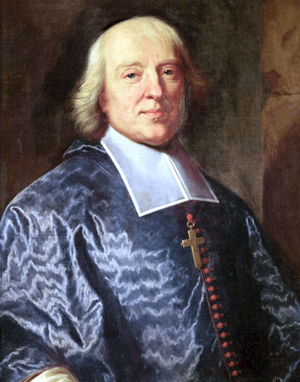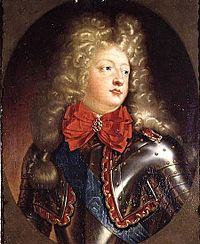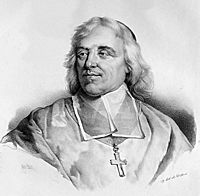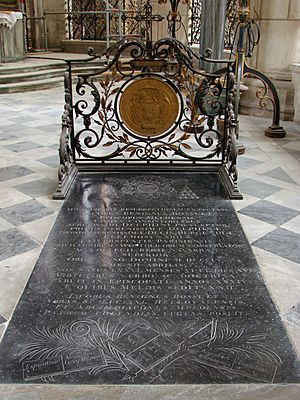Jacques-Bénigne Bossuet facts for kids
Quick facts for kids His Grace Jacques-Bénigne Bossuet |
|
|---|---|
| Bishop of Meaux | |

Portrait of Jacques-Bénigne Bossuet by Hyacinthe Rigaud
|
|
| Church | Roman Catholic Church |
| Diocese | Meaux |
| See | Cathedral of Saint Stephen |
| Enthroned | 17 November 1681 |
| Reign ended | 12 April 1704 |
| Predecessor | Dominique de Ligny |
| Successor | Henri-Pons de Thiard de Bissy |
| Personal details | |
| Born | 27 September 1627 Dijon, France |
| Died | 12 April 1704 (aged 76) Paris, France |
| Nationality | French |
| Occupation | Bishop, writer, tutor |
| Alma mater | College of Navarre, Paris |
| Signature | |
Jacques-Bénigne Lignel Bossuet (27 September 1627 – 12 April 1704) was a French bishop and theologian. He was famous for his powerful sermons and speeches. Many people consider him one of the greatest speakers ever. He was also a master of the French language.
Bossuet was a preacher for Louis XIV of France, the King of France. He strongly believed in political absolutism. This idea meant that kings should have complete power. He also supported the divine right of kings. This meant kings got their power directly from God. He was an important person in the king's court and a politician.
Some of his most famous speeches were given at funerals. These included the funerals of Queen Henrietta Maria (1669) and Henriette, Duchess of Orléans (1670). He also gave a speech for the military leader le Grand Condé (1687).
His book Discours sur l'histoire universelle (Discourse on Universal History) (1681) is also very well-known. Many Catholics see it as a modern version of St. Augustine of Hippo's book, City of God.
Contents
Who Was Jacques-Bénigne Bossuet?
His Early Life and Education
Jacques-Bénigne Bossuet was born in Dijon, France, in 1627. His family had many successful lawyers in Burgundy. His father, Beneigne Bossuet, was a judge. His mother was Marguerite Mouchet.
Jacques-Bénigne was the fifth son. His parents decided he should join the Catholic Church. He was tonsured (a haircut for clergy) at age eight.
He went to school at the Collège des Godrans in Dijon. This was a classical school run by the Jesuits. When his father moved to Metz for work, Bossuet stayed in Dijon. His uncle, Claude Bossuet d'Aiseray, a famous scholar, took care of him. At school, he worked very hard. His friends even called him "an ox accustomed to the plough."
When he was just 13, his father helped him get a special position. He became a canonry in the cathedral of Metz in 1640.
In 1642, Bossuet moved to Paris to study at the Collège de Navarre. There, he finished his classical studies. He also began studying philosophy and theology. His teacher was Nicolas Cornet, a well-known theologian.
Bossuet was already showing great talent for speaking. In 1643, he visited the Hôtel de Rambouillet. This was a popular meeting place for important people. One night, he was asked to give a sermon without any preparation. He was only 16 years old. A famous writer, Vincent Voiture, joked, "I never heard anybody preach so early nor so late."
Becoming a Priest
Bossuet earned his Master of Arts degree in 1643. He presented his first theology paper in 1648. Later that year, he became a subdeacon. He was ordained a deacon in 1649. After this, he started preaching his first sermons.
He presented his second theology paper in 1650. Then, he spent two years preparing for the priesthood. He studied under Saint Vincent de Paul in Paris.
In 1652, Bossuet became an Archdeacon in Sarrebourg. He was ordained a priest on March 18, 1652. A few weeks later, he earned his Doctor of Divinity degree.
He spent the next seven years in Metz as an archdeacon. Metz had many Protestants. Bossuet's first published work was against a Protestant pastor in 1655. He often debated with Protestants and sometimes with Jews. He dreamed of bringing Protestants back to the Catholic Church. He worked hard to improve his preaching skills. Preaching was very important then, as there were no political meetings or newspapers.
His time in Metz helped him become a better speaker. He also continued to study the Bible and the writings of early Church leaders. He gained political experience by joining local assemblies.
In 1657, Bossuet preached in Metz before Anne of Austria, King Louis XIV's mother. Because of this, he was given the title "Counselor and Preacher to the King."
Preaching in Paris
In 1657, Saint Vincent de Paul encouraged Bossuet to move to Paris. He wanted Bossuet to focus entirely on preaching. Bossuet still kept his position at Metz Cathedral. In 1664, he became the cathedral's dean.
Bossuet quickly became known as a great preacher in Paris. By 1660, he was regularly preaching to the royal court. In 1662, he gave his famous sermon "On the Duties of Kings" to King Louis XIV.
In Paris, people expected preachers to be clear and well-spoken. Bossuet believed a priest should be dignified. He did not use tricks to get people's attention.
Bossuet's sermons became less about storytelling over time. He did not write out his speeches completely. Most of the two hundred sermons we have are just rough drafts. Some people preferred other preachers, but important critics like Fénelon admired Bossuet.
Bossuet was a natural speaker. He had a strong voice and could express his thoughts and feelings easily. He was best when speaking about big topics. His Oraisons funèbres (Funeral Orations) are considered his best works. These speeches were a mix of a sermon and a biography. He was unique in this type of speaking.
He preached over 100 sermons between 1659 and 1669. After 1669, he rarely preached in Paris, except for special events.
Tutor to the Dauphin
Teaching the Future King
In 1670, Bossuet was made a bishop. He was then chosen to be the tutor for the nine-year-old Dauphin. The Dauphin was King Louis XIV's oldest son and heir to the throne. This was a big responsibility.

Bossuet tried his best to connect with the boy. But his teaching style was not a good fit for the Dauphin. The Dauphin was often moody and difficult. Bossuet was probably happy when his job ended after nine years. The Dauphin was then sixteen and married.
During these nine years, Bossuet wrote many important books for his student. These included books on philosophy, history, and religion. They were meant to prepare the Dauphin to be a future King of France.
Three of these books became classics:
- Traité de la connaissance de Dieu et de soi-même (Treatise on the Knowledge of God and of Oneself) (1677)
- Discours sur l'histoire universelle (Discourse on Universal History) (1679, published 1682)
- Politique tirée de l'Écriture Sainte (Politics Drawn from Holy Scripture) (1679, published 1709)
These books were connected. The Traité was about God and human nature. The Discours told the story of God's actions throughout history. The Politique explained the rights and duties of a king. Bossuet used the Bible to support his ideas. He wanted to show that the French kingdom under Louis XIV was like the ancient kingdom of Israel. He also used the Bible to remind the Dauphin that kings had duties, not just rights.
Bossuet hoped that France would become a perfect Christian kingdom. He believed that a Christian philosopher would rule it. This is why he strongly supported authority. He believed that "the king, Jesus Christ, and the Church" were all connected to God. His books aimed to give authority a logical basis.
Bossuet believed that God guides human events. He thought that God works through governments and the Church. He felt that disobeying the king or the Church was disobeying God. For him, every big change in history had roots in the past. This made his Discours one of the first books to look at history in a philosophical way.
Bishop of Meaux
His Role as Bishop
In 1681, Bossuet's time as the Dauphin's tutor ended. King Louis XIV appointed him Bishop of Meaux. This was approved by Pope Innocent XI.
Before he could fully take on his new role, Bossuet became involved in a conflict. This was a disagreement between King Louis XIV and Pope Innocent XI. Bossuet tried to find a middle ground. In 1682, he gave a sermon about the unity of the Church. He called for a compromise. The King wanted the French clergy to make a statement against the Pope. Bossuet helped write it, making it as mild as possible. When the Pope rejected it, Bossuet wrote a large defense of the French clergy. This work was published after his death. Unlike other court bishops, Bossuet lived in his diocese. He actively managed its affairs.
Working with Protestants
Bossuet was very interested in uniting Protestants with the Catholic Church. In 1668, he helped convert a famous general, Turenne. In 1670, he published Exposition de la foi catholique (Exposition of the Catholic Faith). This book was so moderate that some people accused him of making Catholic beliefs too simple for Protestants.
In 1688, he published his important book, Histoire des variations des Églises protestantes (History of the Variations of the Protestant Churches). This is considered one of his most brilliant works. Bossuet argued that societies need rules and someone to interpret them. He said that Protestant churches had rejected this interpreter. He showed how Protestants had changed their beliefs over time.
A Protestant minister, Pierre Jurieu, responded to Bossuet's book. Bossuet then wrote Avertissements aux protestants (Warnings to Protestants). In one of these warnings, he discussed the idea of a contract between a ruler and his people. He disagreed with Jurieu's view. Bossuet stated that the Bible commanded slaves to remain in their state. He said it did not require masters to free them. This view on slavery was later seen as very different from what Catholic theology would teach in the 19th century.
Bossuet also corresponded with Leibniz about reuniting the churches. But the talks failed. Leibniz believed that Protestants might accept some Roman doctrines. However, he refused to promise that they would always believe the same things. He said they preferred a church that could change and move forward.
Bossuet faced other challenges. Some writers claimed that Rome itself had changed its beliefs. A priest named Richard Simon argued that Bossuet's teacher, St. Augustine, had changed the original idea of grace. Simon also believed that the Bible should be interpreted like any other book. Bossuet strongly disagreed with Simon.
Another priest, Malebranche, went even further. He argued that God would not break the laws of nature He created. This meant miracles were not possible. Bossuet wrote notes in his book calling these ideas "new, strange, false." He urged Fénelon to attack them. But Malebranche politely dismissed his threats. These disagreements made Bossuet's temper worse.
Earlier, Bossuet had been very kind to the Huguenot ministers he debated. He did not approve of violent acts against Protestants in his own diocese. But now, his patience was running out. He wrote a harsh book called Maximes sur la comédie (1694). In it, he attacked the memory of Molière, a famous playwright who had died many years before.
His Final Years
Bossuet was healthy until he was over 70. But in 1702, he developed chronic kidney stones. By 1704, he was very ill. He died peacefully on April 12, 1704. His funeral speech was given by Charles de la Rue. He was buried in Meaux Cathedral.
Bossuet's Preaching Style
Bossuet is considered one of the most important preachers ever. He helped change preaching from an old, fancy style to a simpler, more direct one. He focused on moral lessons rather than complex religious ideas. He often used the lives of saints or good people as examples.
For instance, he preached about St. Francis de Sales. He also gave famous funeral speeches for Queen Henrietta Maria of France and Henrietta Anne of England. Bossuet's funeral speeches were very powerful. They were translated into many languages. Even Voltaire, who usually disliked clergy, praised Bossuet's amazing speaking skills.
His Important Writings
Bossuet wrote many books and sermons. Here are some of his most notable works:
- Méditation sur la brièveté de la vie (Meditation on the Shortness of Life) (1648)
- Réfutation du catéchisme de Paul Ferry (Refutation of Paul Ferry's Catechism) (1655)
- Oraison funèbre d'Henriette Marie de France (Funeral Oration for Henrietta Maria of France) (1669)
- Oraison funèbre d'Henriette d'Angleterre (Funeral Oration for Henrietta of England) (1670)
- Exposition de la doctrine de l'église catholique sur les matières de controverse (Exposition of the Doctrine of the Catholic Church on Controversial Matters) (1671)
- Traité de la connaissance de Dieu et de soi-même (Treatise on the Knowledge of God and of Oneself) (1677)
- Discours sur l'histoire universelle (Discourse on Universal History) (1681)
- Politique tirée de l'Écriture sainte (Politics Drawn from Holy Scripture) (1679 – published 1709)
- Oraison funèbre du prince de Condé (Funeral Oration for the Prince of Condé) (1687)
- Histoire des variations des Églises protestantes (History of the Variations of the Protestant Churches) (1688)
- Avertissements aux Protestants (Warnings to Protestants) (1689–1691)
Politics Drawn from Holy Scripture
When Bossuet was the tutor for the Dauphin, he wrote several books for his student. One of these was Politics Derived from the Words of Holy Scripture. This book explained the ideas of royal absolutism. It was published after Bossuet's death in 1709.
The book has several parts. Each part talks about the nature, features, duties, and resources of a king. To support his ideas, Bossuet used many quotes from the Bible and psalms.
Bossuet stressed that a king's power comes directly from God. He believed the king's person was sacred. In the third part, Bossuet wrote that "God establishes kings as his ministers, and reigns through them over the people." He also said that people must obey the king because it is a matter of religion and conscience. While he said kings had absolute power, he also said they must use it for the good of everyone. He believed the king was not above the law.
In other parts of the book, Bossuet described what subjects owe the king. He also explained the special duties of a king. For Bossuet, the king and the state were the same. So, people owed the king the same duties they owed their country. He said that only "public enemies" would separate the king's interests from the state's interests. The king's main duty was to protect the state. Bossuet said this could be done by having a good government. Also, by using the state's resources well, and protecting it from dangers.
Bossuet also wrote about the king's resources: armies, wealth, and advice. He explained when wars were fair or unfair. Unfair reasons included wanting to conquer land, steal, or jealousy. He also talked about how a king should spend money. He said the true wealth of a kingdom was its people. He believed it was important to improve people's lives and end poverty.
Images for kids
See also
- In Spanish: Jacques-Bénigne Bossuet para niños
 | Claudette Colvin |
 | Myrlie Evers-Williams |
 | Alberta Odell Jones |







